Best Platforms for Ecommerce Customer Service Excellence

In today’s fast-paced ecommerce world, customer service tools have become game-changers. They don’t just help you solve problems—they create experiences that keep customers coming back. Did you know 88% of online shoppers are more likely to stick with a retailer that offers a personalized experience? That’s especially true for younger generations like Millennials and Gen Z. Plus, 60% of buyers say a tailored shopping journey turns them into repeat customers. Tools like Sobot are leading the way, helping businesses deliver seamless ecommerce customer care while boosting satisfaction and loyalty.
Benefits of Ecommerce Customer Service Tools
Enhancing Customer Satisfaction and Loyalty
When you prioritize customer satisfaction, you’re not just solving problems—you’re building relationships. Happy customers are more likely to stick around, recommend your brand, and even spend more. Metrics like Customer Lifetime Value (CLTV) and Net Promoter Score (NPS) show how much your customers value your service. For example:
| Metric | Description |
|---|---|
| Customer Lifetime Value (CLTV) | Indicates total revenue expected from customers over their lifetime, with higher values showing greater satisfaction and loyalty. |
| Customer Retention Rate | Measures the percentage of customers who return for repeat purchases, reflecting positive customer experience. |
| Conversion Rates | Analyzes the percentage of visitors completing desired actions, highlighting effective areas and potential improvements. |
| Net Promoter Score (NPS) | Gauges customer loyalty by assessing likelihood of recommending the brand, with higher scores indicating better satisfaction. |
| Customer Satisfaction Score (CSAT) | Rates customer satisfaction on a scale, providing insights into how happy customers are with the service. |
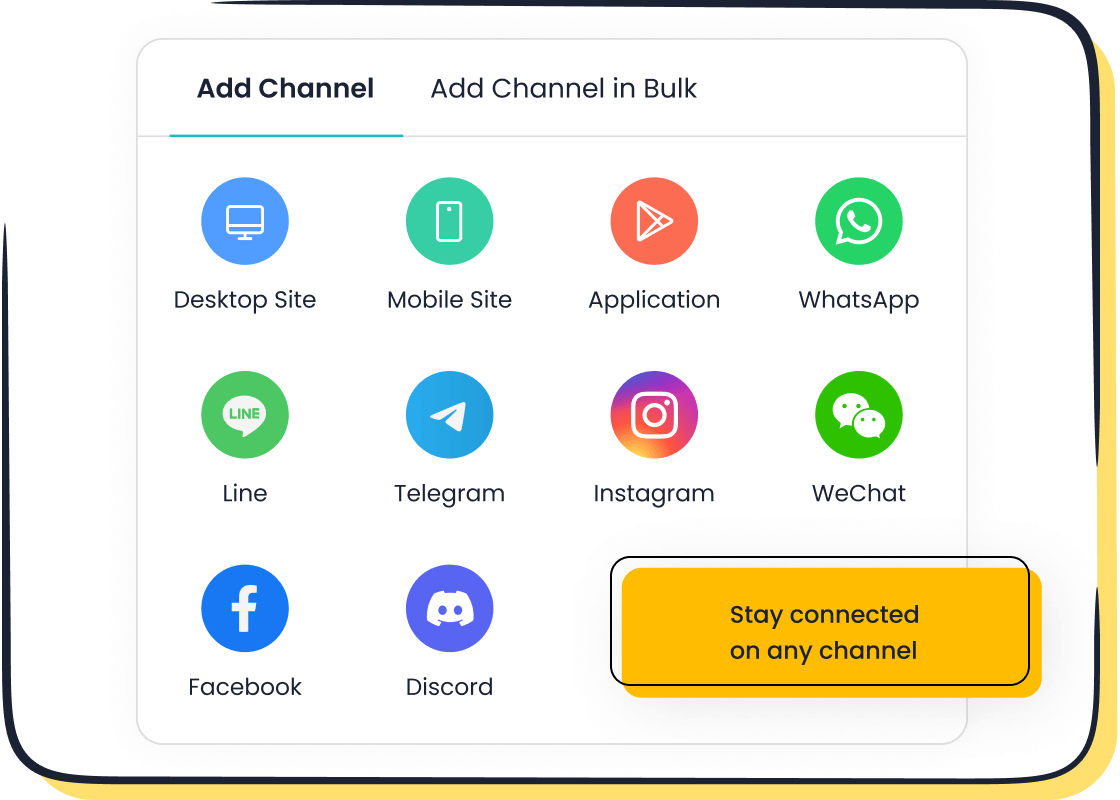
By using customer service tools like live chat or a chatbot, you can offer quick, personalized responses. This keeps customers engaged and loyal. Plus, tools like Sobot’s omnichannel solutions ensure seamless communication across platforms, making every interaction count.
Streamlining Support Operations
Efficient support operations save time and money while keeping your team focused on what matters most—helping customers. Tools like Sobot’s customer service software unify all your communication channels into one workspace. This means no more switching between platforms or losing track of conversations.
Operational metrics like Average First Response Time and Average Ticket Resolution Time highlight how well your support team is performing. Here’s why they matter:
- A low first response time builds trust and loyalty.
- Quick ticket resolution keeps customers happy and reduces frustration.
- High numbers of resolved issues show your team’s efficiency.
With features like AI-powered chatbots and self-service options, you can automate repetitive tasks. This frees up your agents to handle complex issues, improving both productivity and customer satisfaction.
Boosting Sales and Conversions
Did you know great customer support can directly impact your sales? Personalized service makes customers feel valued, which encourages them to buy more. Studies show that tailored product suggestions can boost ecommerce revenues by 10-30%. Even personalized emails lead to transaction rates six times higher than generic ones.
Streamlined customer service also plays a big role. For instance, 17% of users abandon their carts because the checkout process feels too complicated. By simplifying this process and offering real-time support, you can turn hesitant shoppers into loyal buyers.
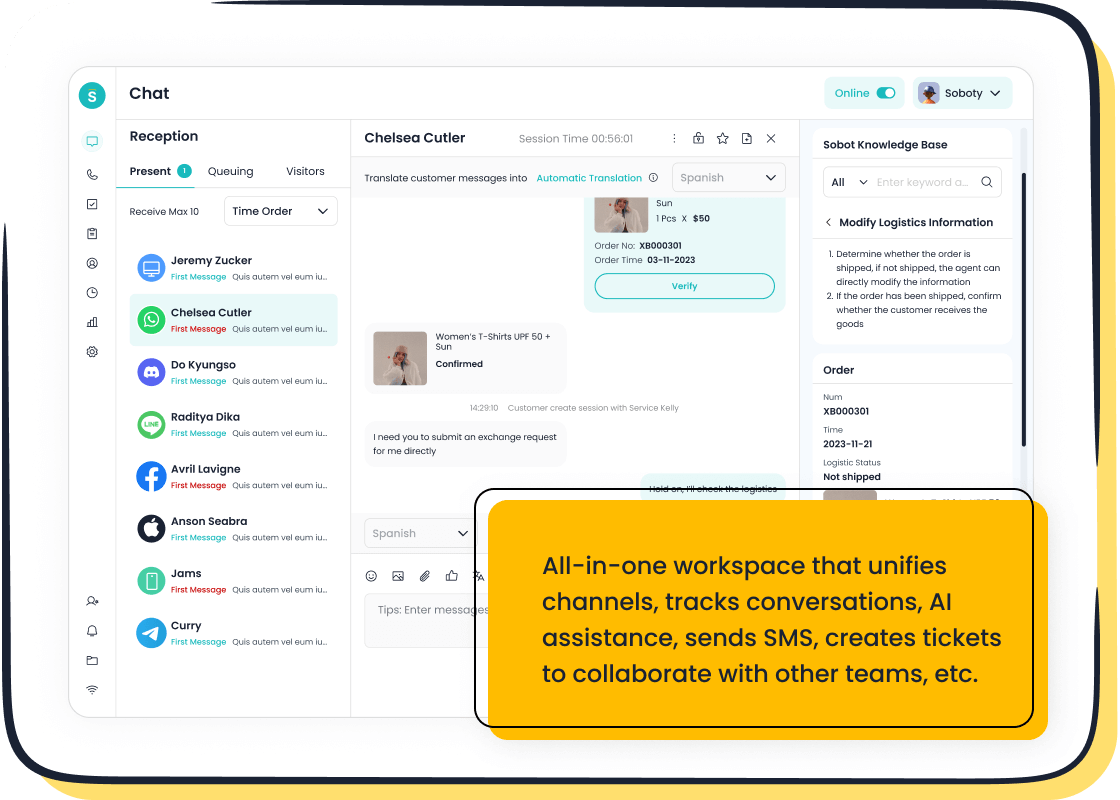
Platforms like Sobot’s live chat help you engage with customers instantly, answer their questions, and guide them through their purchase journey. This not only increases conversions but also builds long-term trust.
Leveraging Data for Better Decision-Making
Data is one of the most powerful tools you can use to improve your ecommerce business. It helps you understand your customers, refine your strategies, and make smarter decisions. By analyzing customer interactions, purchase history, and browsing behavior, you can create personalized experiences that keep customers coming back. For example, tailoring product recommendations based on past purchases can boost satisfaction and drive sales.
When you collect and analyze data at every stage of your operations, you can see what’s working and what’s not. This approach allows you to adjust your strategies in real time. Many businesses struggle because they don’t measure the impact of their changes. But when you track data before, during, and after implementing new tools or processes, you can monitor progress and assess your return on investment (ROI). This ensures your efforts are paying off.
Data-driven decision-making also helps you move away from generic marketing strategies. Instead of guessing what your customers want, you can use insights to create campaigns that match their preferences. This leads to higher conversion rates and happier customers. Companies like Cart.com have shown how valuable data can be. By leveraging analytics, they raised over $380 million in funding and made strategic acquisitions, proving that data shapes successful business strategies.
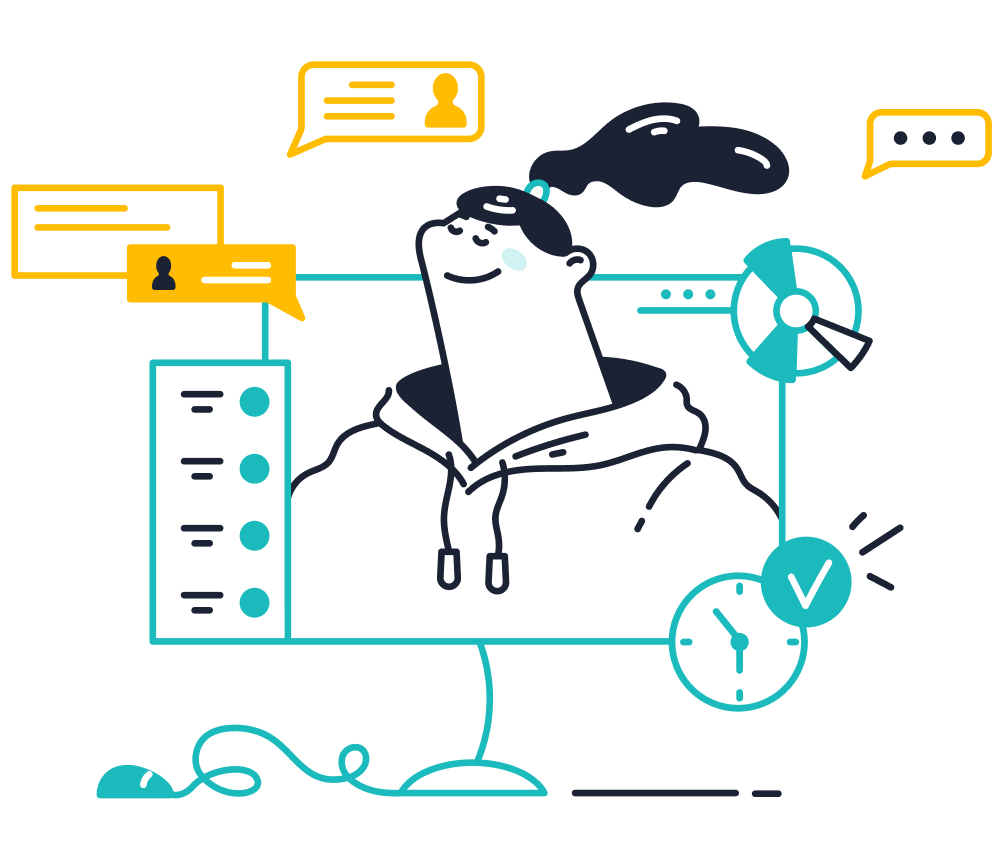
Platforms like Sobot’s live chat and chatbot solutions make it easy to gather and analyze customer data. These tools provide built-in analytics that evaluate over 150 indicators, helping you optimize your support operations and improve customer satisfaction. With the right data, you can make decisions that drive growth and keep your business ahead of the competition.
Top Live Chat Platforms for Ecommerce in 2025

Key Features of Live Chat Tools
Live chat tools have become essential for ecommerce businesses aiming to deliver exceptional customer experiences. These tools allow you to connect with your customers in real time, offering instant support and personalized interactions. But what makes a live chat tool truly effective? Let’s look at some key features backed by data:
| Feature | Statistic | Impact on Effectiveness |
|---|---|---|
| Customer Preference | 73% of consumers prefer live chat for communication | Enhances customer satisfaction |
| Customer Satisfaction | Average satisfaction rating of 83.1% for live chat | Indicates high effectiveness in customer service |
| Proactive Engagement | 87% of U.S. adults want proactive contact from companies | Shows demand for proactive service |
| Purchase Likelihood | Visitors engaging in proactive chat are 6.3 times more likely to purchase | Direct correlation to increased sales conversions |
| Revenue Increase | Customers engaging in chat can elevate revenue by 48% per chat hour | Demonstrates significant impact on revenue growth |
| Purchase Trigger | 38% of consumers completed a purchase after engaging in live chat | Highlights the role of live chat in decision-making |
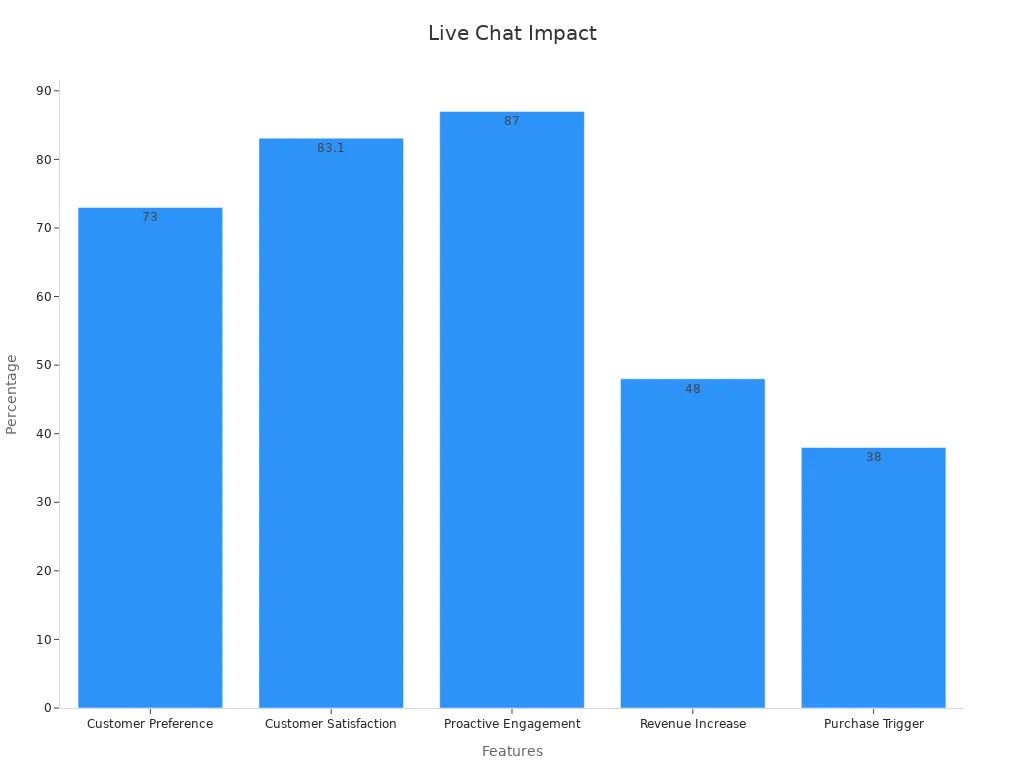
These features show how live chat software can transform your customer service strategy. By offering proactive engagement and personalized support, you can boost satisfaction and drive sales.
Why Sobot Live Chat Stands Out
Sobot Live Chat is a game-changer in the world of customer service platforms. It’s designed to help you connect with your customers seamlessly across multiple channels, including websites, apps, and social media platforms like WhatsApp and Instagram. What sets it apart? Its ability to unify all conversations into one AI-enhanced workspace. This means no more juggling between platforms—everything you need is in one place.
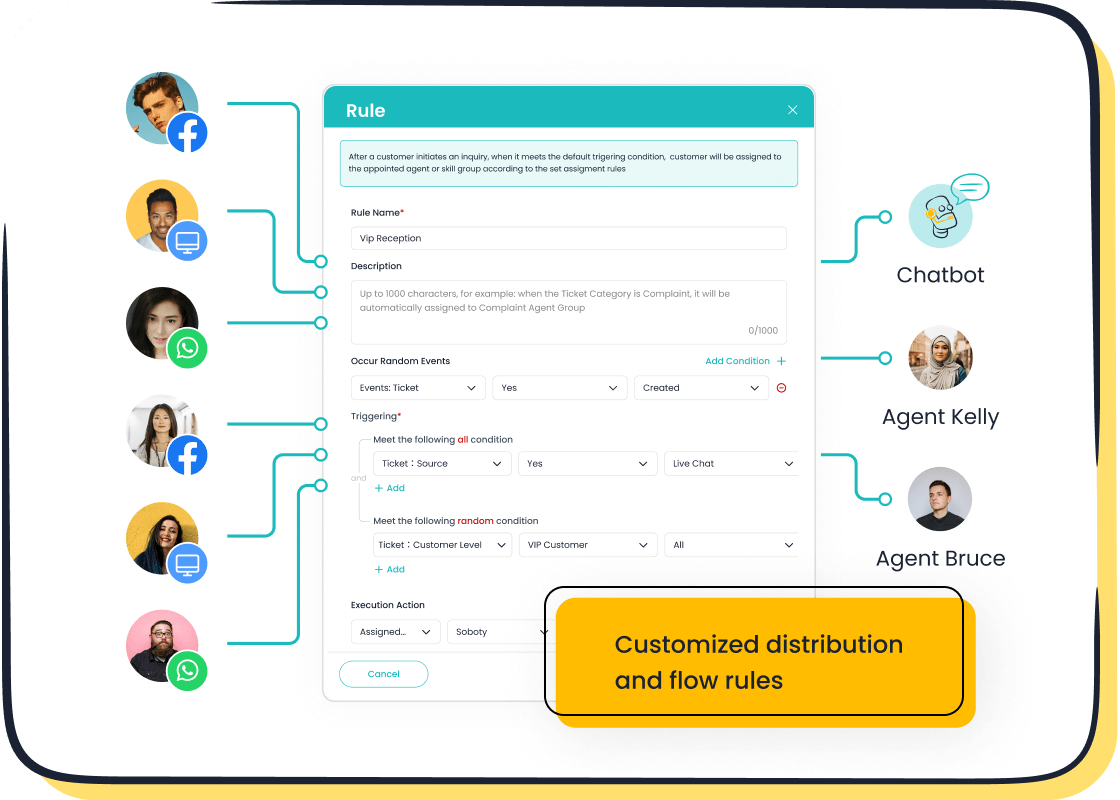
Sobot’s live chat software doesn’t just stop at convenience. It uses AI-powered tools to analyze customer behavior and provide tailored recommendations. This approach has been proven to increase conversion rates by 38%. Plus, with built-in analytics evaluating over 150 indicators, you can make data-driven decisions to optimize your support operations. Whether you’re looking to improve efficiency or foster customer loyalty, Sobot Live Chat has you covered.
Best Live Chat Platforms to Consider
While Sobot Live Chat is a standout choice, there are other platforms worth exploring. The live commerce market is booming, with projections showing growth from $1.26 billion in 2024 to $1.55 billion in 2025—a compound annual growth rate (CAGR) of 22.9%. This growth highlights the increasing importance of live chat tools in ecommerce.
When choosing a platform, focus on features like omnichannel support, AI integration, and analytics capabilities. These features ensure you can meet customer expectations and stay ahead of the competition. Sobot’s solutions, for example, excel in these areas, making it a top contender for businesses aiming to enhance their customer service software.
Best CRM Platforms for Ecommerce Customer Service
What is a CRM and Why It’s Essential
Customer Relationship Management (CRM) tools are the backbone of ecommerce customer service. They help you manage interactions with your customers, track their preferences, and deliver personalized experiences. Imagine having a centralized hub where all customer data lives—this is what a CRM platform offers. It keeps records of every interaction, from emails to live chat conversations, ensuring nothing gets lost.
Why does this matter? Because personalization drives loyalty. When you tailor your products and services to meet individual needs, customers feel valued. CRM systems also automate repetitive tasks like sending follow-up emails or collecting feedback through surveys. This saves time and boosts efficiency. Without a CRM, you risk losing critical details that could improve your customer service. For ecommerce businesses, a CRM isn’t just helpful—it’s essential for growth and customer satisfaction.
Top CRM Tools for Ecommerce in 2025
Choosing the right CRM platform can transform your ecommerce operations. Here’s a look at some of the top-performing tools for 2025:
| CRM Tool | Description | Overall Score |
|---|---|---|
| Bitrix24 | Best free ecommerce CRM | 4.3/5 |
| Creatio CRM | Best for no-code automation | 4.26/5 |
| Zoho CRM | Best for automatic lead capture | 4.2/5 |
| HubSpot CRM | Best for payment processing | 4.17/5 |
| Pipedrive | Best for building product catalogs | 4.09/5 |
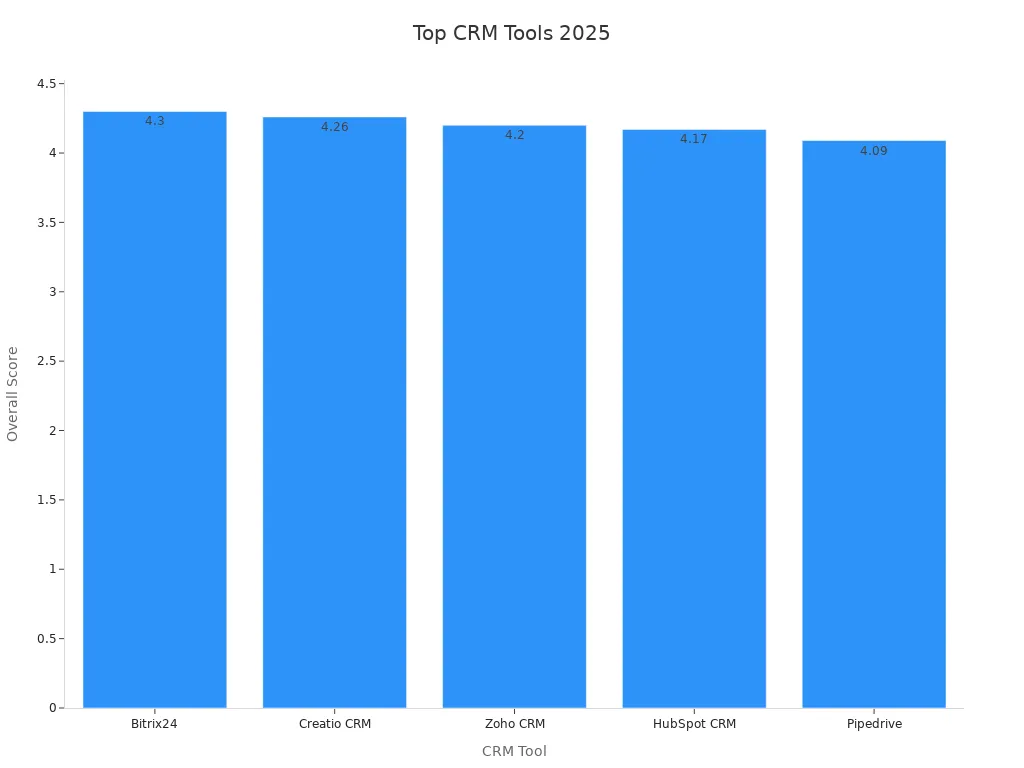
These tools excel in areas like automation, lead management, and payment processing. For example, Zoho CRM simplifies lead capture, while HubSpot CRM integrates payment solutions seamlessly. If you’re looking for a platform that combines ease of use with powerful features, these options are worth exploring.
Features to Look for in a CRM Platform
Not all CRM platforms are created equal. To find the best fit for your ecommerce business, focus on these essential features:
| Essential Feature | Description |
|---|---|
| Centralized customer database | A unified view of customer interactions for personalized assistance. |
| Customizable dashboards and reporting | Flexibility in tracking metrics that matter to your organization. |
| Integration capabilities | Seamless integration with other tools to streamline processes. |
| Automation and workflow management | Automating repetitive tasks to improve efficiency and customer satisfaction. |
| Mobile accessibility | Access to customer data on-the-go for sales representatives. |
| Remote work capabilities | Cloud-based access to ensure real-time data availability for remote teams. |
| Intuitive and easy-to-use interface | User-friendly design to enhance employee adoption and reduce learning curves. |
| Enterprise-level security features | Essential security measures to protect against unauthorized access and data breaches. |
A CRM platform with these features can help you stay organized, improve customer satisfaction, and boost sales. For instance, Sobot’s contact center solutions integrate CRM capabilities with omnichannel support, ensuring seamless communication across platforms. This makes it easier to track customer interactions and deliver personalized service.
AI-Powered Customer Service Tools
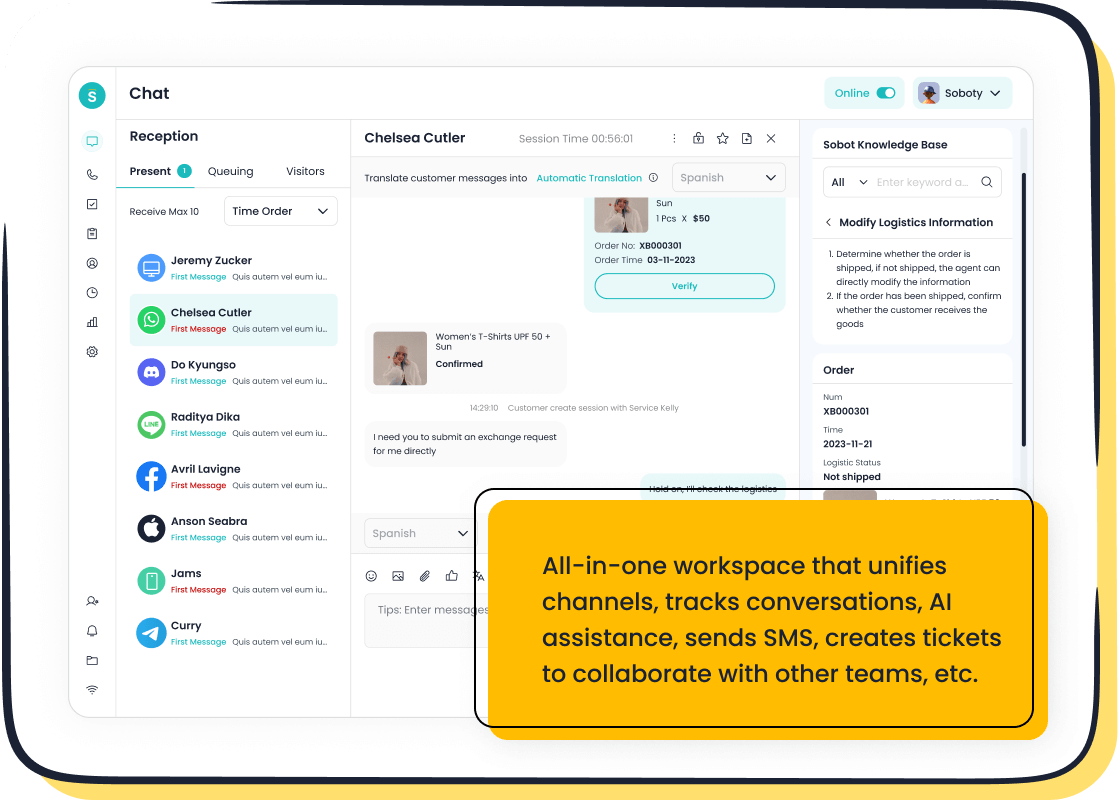
The Role of AI in Ecommerce Customer Support
AI is transforming how businesses handle customer interactions. It acts as a 24/7 assistant, answering routine questions and providing instant solutions. This ensures your customers never have to wait, even during peak hours. For ecommerce, where speed and personalization are key, AI-powered customer support tools are game-changers. They analyze customer behavior, predict needs, and deliver tailored experiences.
Take chatbots, for example. These tools can guide shoppers through their journey, from answering product questions to assisting with checkout. This not only improves satisfaction but also boosts conversions. AI also helps businesses save costs by automating repetitive tasks, allowing human agents to focus on complex issues. With the growing demand for digital customer service, AI is becoming a must-have for businesses aiming to stay competitive.
| Trend/Insight | Description |
|---|---|
| Demand for personalized customer service | Customers increasingly expect tailored experiences, driving the need for AI solutions. |
| Cost-effectiveness | AI tools help reduce operational costs, making them attractive for ecommerce businesses. |
| Accurate insights into customer behavior | AI provides deeper analytics, helping businesses understand and predict customer trends. |
| Growth of Conversational AI | The market for AI-driven chatbots is expanding, with many organizations adopting these tools. |
| Projected growth in AI adoption by 2025 | Online stores are expected to be leading adopters of AI technologies in the near future. |
| Positive impact on business profitability | AI solutions have shown to enhance profitability across various sectors, including ecommerce. |
Leading AI-Powered Platforms for 2025
AI-powered platforms are reshaping ecommerce customer support software. By 2025, the market value of AI in customer service is projected to reach $8.65 billion, with adoption rates climbing to 50% among businesses. Platforms like Sobot are leading this revolution. Sobot’s AI-driven chatbot offers multilingual support, auto-translation, and 24/7 availability. It handles repetitive queries, freeing agents to focus on more complex tasks.
| Year | Market Value (in billion USD) |
|---|---|
| 2025 | 8.65 |
| 2030 | 17.1 |
Sobot’s chatbot also integrates seamlessly with other tools, ensuring a unified experience. Its built-in analytics evaluate over 150 indicators, helping businesses optimize their operations. This makes it a top choice for companies looking to enhance their customer service software.
Benefits and Limitations of AI Tools
AI tools bring numerous benefits to ecommerce businesses. They improve customer engagement, save costs, and enhance operational efficiency. For instance, chatbots provide 24/7 self-service options, ensuring customers get instant answers. This boosts satisfaction and reduces wait times.
| Benefits of AI Tools in Ecommerce | Challenges of AI Tools in Ecommerce |
|---|---|
| Improved customer engagement | Maintaining a conversational tone |
| Cost savings | Ensuring accurate understanding of user intent |
| Enhanced operational efficiency | Balancing automation with human interaction |
However, AI tools aren’t perfect. They sometimes struggle to understand complex queries or maintain a natural tone. That’s why combining AI with human agents is essential. Platforms like Sobot excel in this area, offering a balance between automation and human touch. By leveraging AI wisely, you can deliver exceptional digital customer service while staying ahead of the competition.
How to Choose the Right Customer Service Platform
Assessing Your Business Needs
Choosing the right customer service platform starts with understanding your business needs. Every ecommerce business has unique challenges, whether it’s managing high inquiry volumes or reducing cart abandonment rates. For example, the 79.53% cart abandonment rate in 2023 highlights the importance of tools that analyze customer behavior effectively.
Start by evaluating your current pain points. Are customers waiting too long for responses? Are your agents overwhelmed with repetitive tasks? Benchmark software can help you assess your performance objectively. It uses key performance indicators (KPIs) like Customer Satisfaction (CSAT) and First Response Time (FRT) to measure how well your support operations align with your goals.
| KPI Name | Description |
|---|---|
| Customer Satisfaction (CSAT) | Measures customer satisfaction after interactions, indicating service quality. |
| First Response Time (FRT) | Tracks the time taken for an agent to respond to a customer query, impacting customer retention. |
| Net Promoter Score (NPS) | Assesses customer likelihood to recommend the service, reflecting overall satisfaction and loyalty. |
| Customer Retention Rate (CRR) | Indicates the percentage of customers retained over a period, crucial for long-term business success. |
| Escalation Rate | Monitors how often issues are escalated, highlighting potential problems in service resolution. |
These metrics provide a clear picture of your needs and help you identify the tools that will make the biggest impact.
Matching Features to Your Goals
Once you’ve assessed your needs, it’s time to match platform features to your goals. Look for tools that offer capabilities like multi-language support, analytics, and multi-channel integration. These features ensure you can cater to diverse customers while improving operational efficiency.
| Feature | Description |
|---|---|
| Multi-Language Support | Allows businesses to cater to a diverse customer base by supporting multiple languages. |
| Analytics and Insights | Provides data-driven insights to help improve customer engagement and satisfaction. |
| Multi-Channel Integration | Integrates with various ecommerce platforms to streamline operations and improve customer experience. |
| Customer Support | Offers assistance through live chat and email, ensuring users can get help when needed. |

For example, Sobot’s omnichannel solutions unify communication across platforms, making it easier to track customer interactions. Its live chat tool combines AI-powered analytics with real-time support, helping you boost satisfaction and conversions.
Importance of Free Trials and Demos
Free trials and demos are essential when choosing a customer service platform. They let you test the tools in real-world scenarios before committing. This is especially important for ecommerce businesses, where seamless customer support can make or break a sale.
During the trial, focus on how the platform handles common tasks like responding to inquiries or managing escalations. Does it integrate well with your existing systems? Is the interface user-friendly? Platforms like Sobot offer free trials for their live chat tools, allowing you to explore features like AI-assisted responses and built-in analytics.
Tip: Use the trial period to involve your team. Their feedback will help you determine if the platform meets your operational needs and aligns with your goals.
Budget Considerations and Scalability
When choosing customer service tools for your ecommerce business, budget and scalability are two factors you can’t ignore. These decisions directly impact your ability to grow while staying cost-effective. So, how do you strike the right balance?
Start by understanding your costs. Metrics like Customer Acquisition Cost (CAC) and Customer Lifetime Value (CLV) are essential. CAC tells you how much you’re spending to gain a new customer. Lowering this cost means you can scale your business more profitably. On the other hand, CLV estimates the total revenue a customer brings over their lifetime. Maximizing this value ensures your customers contribute significantly to long-term growth.
Scalability is just as important. As your business grows, your tools need to grow with you. For example, platforms like Sobot offer solutions that adapt to your needs. Whether you’re handling a few inquiries or thousands, tools like live chat and chatbot support ensure you’re ready for anything. Plus, outsourcing certain services can lead to operational cost savings, freeing up your budget for other priorities.
You should also consider how effectively your site converts visits into sales. Metrics like sessions with checkout and conversion rates can guide your budget planning. If your tools improve these numbers, they’re worth the investment. For instance, Sobot’s omnichannel platform helps unify customer interactions, boosting efficiency and satisfaction.
Finally, think about the future. Choose tools that offer flexibility and room to grow. A scalable platform ensures you won’t outgrow your customer service software as your business expands. By focusing on both budget and scalability, you can set your business up for long-term success.
Customer service tools are more than just software—they’re the backbone of ecommerce success. They help you monitor your business health, make smarter decisions, and improve the customer journey. Metrics like Average Order Value (AOV), Customer Lifetime Value (CLV), and conversion rates show how these tools directly impact your growth.
Take the time to explore platforms like Sobot and others mentioned here. Each offers unique features to fit your needs. By investing in the right tools, you’ll not only enhance customer satisfaction but also stay ahead in a competitive market. After all, great service isn’t just a bonus—it’s your edge.
FAQ
What are ecommerce customer service tools?
Ecommerce customer service tools help you manage customer interactions across platforms like websites, apps, and social media. They streamline communication, automate repetitive tasks, and improve customer satisfaction. Tools like live chat, chatbots, and CRM systems are popular choices for enhancing your support operations.
How do live chat tools improve customer experience?
Live chat tools let you connect with customers instantly. They provide real-time support, answer questions, and guide shoppers through their journey. This quick response builds trust, reduces frustration, and increases the chances of turning visitors into loyal buyers. Plus, they’re super convenient for customers!
Can AI-powered tools replace human agents?
AI tools handle repetitive tasks and provide 24/7 support, but they can’t fully replace human agents. Complex issues still need a personal touch. Combining AI with human expertise ensures your customers get fast, accurate, and empathetic service when they need it most.
Why is omnichannel support important?
Omnichannel support ensures seamless communication across platforms like email, social media, and live chat. It keeps all conversations in one place, so you never lose track of customer interactions. This consistency improves satisfaction and makes your business look more professional.
Are free trials worth trying?
Absolutely! Free trials let you test a platform’s features before committing. You can see how it fits your needs, evaluate its ease of use, and involve your team for feedback. For example, Sobot offers a free trial for its live chat tool, so you can explore its benefits risk-free.
Tip: Always use the trial period to test real-world scenarios and ensure the platform aligns with your goals.
See Also
Best Live Chat Solutions for Online Retailers in 2024
The Impact of Chatbots on E-commerce Customer Happiness
2024's Leading Customer Support Software: The Top 10
